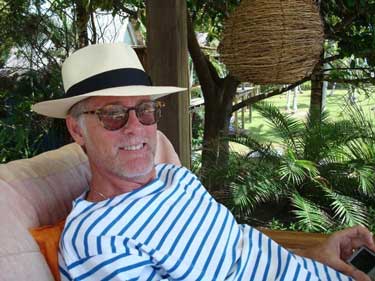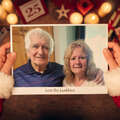From Brazil to Cleveland, Patrick Fights For Minimally Invasive Surgery
By Adam Pick on September 11, 2009
One of the critcal learnings from my heart valve surgery experience was:
The patient (or their caregiver) must, at times, be tenacious. We must, at times, ask questions that may or may not be silly. We must, at times, stand up for ourselves and our hearts. Ultimately… we must, at all times, be our own, best advocate.
I am reminded of this belief as my inbox is often filled with patient and caregiver emails that radiate frustration and confusion. Many of these emails begin, “Adam, I really need to vent right now. I’m having problems with __________.” However you chose to fill-in that blank, I can relate.

Patrick Hightower – Heart Valve Surgery Patient
Recently, I received a patient story that illustrates just how far certain patients and caregivers will go to get the best care. Here, for your review, is the educational and inspirational story of Patrick Hightower:
Adam, I had this picture taken 24 days after my heart valve surgery on August 9, 2009. As you can see, my main incision is about 2 1/2 inches long. I also have a 1/2 inch scar just below it – which was for the drain line.
Although it may appear that I had minor heart surgery, I did in-fact have degenerative mitral valve with severe regurgitation, persistent atrial fibrillation, and tricuspid regurgitation. An annuloplasty band was installed in each valve, each valve was repaired and a MAZE procedure was done to stop the fibrillation. The actual surgery was six hours plus two hours pre-op and another two-hours post-op. I have no idea how long I was on the heart-lung machine.
I owe a huge debt of gratitude to my surgeon, Dr. Marc Gillinov and The Cleveland Clinic for my successful surgery. I realize that each person’s situation is different but, for me, the minimally invasive surgical procedure used by Dr. Gillinov was ideal.

Dr. A. Marc Gillinov – Patrick’s Surgeon
In my situation, I had to literally fight for my right to have a top surgeon, minimally invasive surgery and a little scar. My first doctor in Brazil thought I needed to see a psychiatrist because I was so adamant about the minimally invasive approach. Another doctor said I didn’t need to do anything. The third cardiologist, who is now my primary Brazilian cardiologist, said, “Go to the States!” He felt my problem could not be surgically treated safely in Brazil. Finally, my cardiologist in Houston said, “We really don’t do the minimally invasive procedure.”

After all of those dead-ends, I wrote Dr. Gillinov at The Cleveland Clinic. Soon after, I sent Dr. Gillinov my test results and waited, hoped and prayed for him to accept me. I did this with no cardiologist recommendation, just perseverance.
As for the details of my surgery:
- I was in the hospital for a total of five days which includes my surgical day. As you know, surgical complications can occur. Mine was a problem with residual air in the surgical cavity. As I live in Brazil, this presented a problem with my flight home. After discharge, I was released to the adjoining hotel. After my 7-day checkup, I was allowed to fly home.
- Eight days after surgery, I was only taking four Motrin and two Vicodin a day. Plus, I am taking one heart rhythm pill for six weeks and a baby aspirin. No Coumadin for me.
- Like most, I get tired quickly and need to rest often. I am sore and have an occasional muscle spasm. The hospital really did a number on my sleeping rhythm, so that is still disrupted.
In light of my story, please tell others to research their problems, consider their options and get second, third and forth opinions if at all possible.
Finally, your heart valve surgery book provides a great service for all of us patients – both before and after surgery.
Thank you!
Sincerely,
Patrick M. Hightower
|
Harry Feuerherm says on September 11th, 2009 at 11:53 am |
|
I had been having Heart problems for ~ a week, it started Monday morning, 8/17. I have had an irregularity in my EKG for ~ 30 or more years. No one knew what it was but I was able to function OK. On the morning of 8/17, I woke up at 12:30 AM, could not go back to sleep. When I went to work, I stopped in at the nurse’s office and she pointed out that my pulse rate was between 130 – 150/min. Blood pressure was low. Not a good combination. I started working with my Doctor at the clinic and he finally sent me up for an Ecocardiogram about 2 hours away. (I live in rural Arkansas.) The Cardiologist saw the results that day (Friday 8/21) and put me into the hospital right then. |
 |
|
ruth bash says on September 13th, 2009 at 2:41 pm |
|
Dear Adam, on April 1st 2009 I was diagnosed with Atrial Fibrilation and placed on Coumadon. My holter test was in the normal range. The following electrocardigram revealed moderate to severe mitral valve regurgitation. A few weeks later followed the TEE and it confirmed that I had severe mitral valve regurgitation and A fib. The final test before surgery was going to be the catheterization. I was stunned. I am 75 years old, very active, walk almost every day three miles in 42 minutes with an incline up to 7. I always had a heart healthy diet, worked hard and manage a large garden. There were only minor symphtoms, which could be age related. I could not imagine what happened and was scared. Was I ever scared! Your website gave me lots of good information and your book helped prepare my husband for what was going to come. I started to prepare myself for the surgery which was suppose to happen within 3 month, I was told. We live in the very North Eastern part of Pennsylvania. It was my understanding from my cardiologist that “repair” would be required and few if any physicians in our area were performing this operation, never mind minimally invasive surgery. which I was hoping for. My husband and I decided to have the the last and final test in Cleveland. It was a 9 + hour drive by car (with stops). I had decided that if my final test showed that I was a good candidate for less invasive surgery, I was hoping to get it done in Cleveland. There is nothing like experience, I figured. I met Dr. Simpfendorfer and was very impressed. After the catheterization he told me that he wanted me to talk to Dr. Gillinov about the surgery, all my tests were good and the mitral valve regurgitation according the an echocardiogram and other tests were in the mild to moderate range. It was important for me to find out what type of surgery was needed. The next morning I spoke with Dr. Gillinov before heading home and was told that Dr. Gillinov agreed with Dr. Simpfendorfer that surgery at this time would be premature. I could not believe it at first and it took weeks to sink in. I was so lucky to be seen by physicians of the caliber of Dr. Simpfendorfer and Dr. Gillinov. I had been terrified of the catheterization because of my age and the fact that I have tiny arteries, but everything went well and the whole athmosphere of the hospital was reassuring. I was awed by the fact that Dr. Gillinov would take the time out of his busy schedule to explain things and to reassure me. |
 |












